Drone port plan could bring big Rwandan boost
 A group of architects and developers have proposed building a series of ‘drone port’ that would allow cargo drones to get essential supplies to rural parts of Africa.
A group of architects and developers have proposed building a series of ‘drone port’ that would allow cargo drones to get essential supplies to rural parts of Africa.
Eminent British architect Sir Norman Foster's firm Foster + Partners, the Swiss Federal Institute of Technology in Lausanne and its company Afrotech have outlined plans for a pilot project to begin in Rwanda next year.
“Specialist drones can carry blood and life-saving supplies over 100 kilometres at minimal cost, providing an affordable alternative that can complement road-based deliveries,” the proposal says.
“Cargo drone routes have utility wherever there is a lack of roads.
“Just as mobile phones dispensed with landlines, cargo drones can transcend geographical barriers such as mountains, lakes, and unnavigable rivers without the need for large-scale physical infrastructure.”
Their tests will employ Unmanned Aerial Vehicles (UAVs) with a three-metre wingspan that can carry deliveries of up to 10 kilograms.
But there could later be replaced with drones that have a six-metre wingspan and capacity of 100 kilograms.
Medecins Sans Frontieres conducted trials last year that used UAVs to pick up tuberculosis samples from remote villages in Papua New Guinea.
In that project, the drones were able to cover a distance that takes about 4 hours by car in just 55 minutes.
Rwanda's pilot project is expected to see three ‘drone port’ buildings that would allow UAVs to cover almost half of Rwanda's countryside.
The ports would provide a place for drones to land, as well as a medical clinic, courier room and e-commerce hub.
“Africa is a continent where the gap between the population and infrastructural growth is increasing exponentially,” Sir Norman said at the project launch.
“The dearth of terrestrial infrastructure has a direct impact on the ability to deliver life-giving supplies, indeed where something as basic as blood is not always available for timely treatment.
“We require immediate bold, radical solutions to address this issue.”
Rwanda’s president Paul Kagame wants his country to become a major technology hub, and has pushed mobile phone and internet coverage across the country in that effort.
However, the rolling landscape of the nation known as the “land of a thousand hills” means physical access to remote areas is still a massive challenge.
“The introduction of drones can add to the many solutions we have available to tackle infrastructure challenges in Rwanda,” Junior Sabena Mutabazi recently wrote in a national newspaper.








 Print
Print